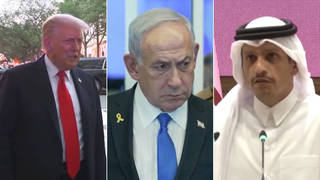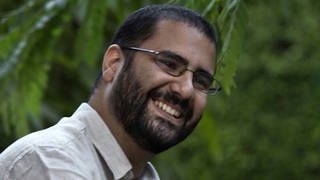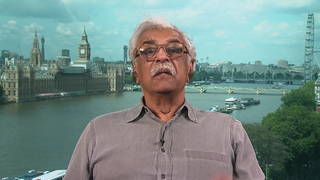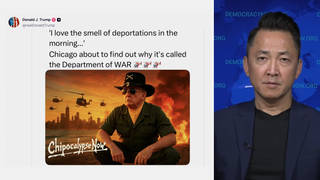
Topics
Guests
- Phyllis Bennisfellow at the Institute for Policy Studies. She’s written several books, including, most recently, Understanding ISIS and the New Global War on Terror.
The U.S. military carried out two airstrikes in Libya against ISIS fighters on Monday in the latest escalation of the U.S. war against the self-proclaimed Islamic State. The strikes took place in the city of Sirte. Pentagon officials said the campaign would continue until ISIS has been driven from the city, which it took over last year. Libya has been engulfed in fighting after a U.S.-backed military intervention ousted longtime dictator Muammar Gaddafi in 2011. The Pentagon said Libya’s Western-backed unity government requested the airstrikes. The so-called unity government is one of three competing governments that claim legitimacy in the country. We speak to Phyllis Bennis, fellow at the Institute for Policy Studies. She’s author of “Understanding ISIS and the New Global War on Terror.”
Transcript
JUAN GONZÁLEZ: The U.S. military carried out two airstrikes in Libya against ISIS fighters on Monday in the latest escalation of the U.S. war against the self-proclaimed Islamic State. The strikes took place in the city of Sirte. Pentagon officials said the campaign would continue until ISIS has been driven from the city, which it took over last year.
AMY GOODMAN: Libya has been engulfed in fighting after a U.S.-backed military intervention ousted the longtime dictator Muammar Gaddafi in 2011. The Pentagon said Libya’s Western-backed unity government requested the airstrikes. The so-called unity government is one of three competing governments that claim legitimacy in Libya.
Joining us now from Washington, Phyllis Bennis, fellow at the Institute for Policy Studies, author of Understanding ISIS and the New Global War on Terror.
Phyllis, welcome back to Democracy Now! We don’t have much time, but can you talk about what has just taken place, United States bombing Libya?
PHYLLIS BENNIS: Well, certainly, hearing all of the news about the Khans and their extraordinary story, we’re reminded of the price that is paid in this country for the continuing wars, the global war on terror, as George Bush used to call it. President Obama wants to call it something else, but it’s the same war.
This is a significant escalation. The airstrikes in Libya were aimed at the ISIS forces that remain in the city of Sirte. But the city of Sirte is a city of now about 80,000 people. We’ve had no reports of who else might have been injured or killed in those strikes, what’s happened to the civilian population. It’s as if there’s no one there but the few hundred ISIS fighters that the U.S. says are there. Libya has been in chaos since the U.S.-NATO attack, the regime change attack in 2011 that led to the ouster and then the killing of Muammar Gaddafi and the overthrow of his regime. There has been absolute military chaos. The weapons of the Gaddafi regime have spread throughout region, making all of the situations there much, much worse.
And one of the things that we’re seeing is that this kind of attack on territory controlled by ISIS simply does not destroy ISIS. You can’t destroy terrorism that way. What it does, in some circumstances, it might limit the number—excuse me—the number of people that remain under ISIS control, which is, by itself, a good thing, but you can’t take that out of the context that what that really means is you’re playing a kind of global whack-a-mole, where you stamp out ISIS in one place, and it pops up somewhere else. You take away territory they control, and they re-emerge as a more traditional terrorist operation, attacking people whether in Brussels or in Nice or in Baghdad or in Kabul or somewhere else.
So, there are numerous problems with this. One of the key ones is that this action was taken without authorization. President Obama made the decision a few days ago to authorize these military strikes without any authorization from Congress. Congress has refused to debate and discuss the possibility of a new authorization. And the Obama administration maintains its position that while it would like a new authorization specific to ISIS, it doesn’t believe it needs one, and it therefore continues to rely on the 2001 authorization, which called for military force to be used against the forces who had carried out the attacks of September 11. Now, ISIS, as we know, did not even exist until five years later. ISIS had no connection to the attacks of 9/11. So, the notion that this authorization now applies in Libya, where we heard the same story about the rationale for the Obama administration to take up bombing in Syria, to renew the U.S. force involvement in Iraq, in Yemen, supporting the Saudi government—in all of these arenas, the administration continues to rely on an outdated, not appropriate authorization, which does not in fact authorize the escalation that they are now calling for.
JUAN GONZÁLEZ: But, Phyllis—
PHYLLIS BENNIS: So this is a very serious problem.
JUAN GONZÁLEZ: Phyllis, if I can, under what authorization does the Obama administration even launch these attacks, since there are basically three competing governments claiming to be running Libya?
PHYLLIS BENNIS: You know, Juan, one of the things they’re saying is that this attack was in response to the request of the U.N.-backed government. Now, as you say, there are three competing governments. One of them was essentially created by the United Nations negotiators to try and pull together all the forces. It hasn’t worked. It’s one of three that are competing for legitimacy, competing for military and political power. So, the U.S. has gone in on the side of that government. What’s interesting is they have not even made the claim that there was an immediate threat to the United States or to American citizens. That could be used to justify an immediate presidential order. They have not tried to say, because that certainly that isn’t the case—there is no threat to the United States coming out of the chaos in Libya—
AMY GOODMAN: Phyllis, very—Phyllis, very quickly, in October of 2011, then-Secretary of State Hillary Clinton was between interviews when she was told that Muammar Gaddafi had been killed. This was her response.
SECRETARY OF STATE HILLARY CLINTON: We came, we saw, he died.
CBS INTERVIEWER: Did it have anything to do with your visit?
SECRETARY OF STATE HILLARY CLINTON: No. Oh, I’m sure it did.
AMY GOODMAN: That was Hillary Clinton in 2011. Your final response, Phyllis?
PHYLLIS BENNIS: Whatever else, this was not a joke. It was not a joke for the thousands of people who have died in Libya. It was not a joke for anyone. The situation in Libya is far worse now than it was. Hillary Clinton, of course, as secretary of state then, was the leading voice urging President Obama to participate. And this kind of escalation is only going to make the situation worse. There is no military response to terrorism. President Obama says that over and over again. It’s time we held him accountable to his own words, to say there is no military response, therefore we shouldn’t use military methods against terrorism. It doesn’t work.
AMY GOODMAN: Phyllis Bennis, thanks so much for being with us, fellow at the Institute for Policy Studies.












Media Options